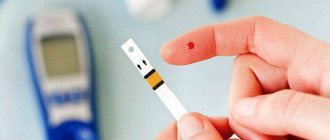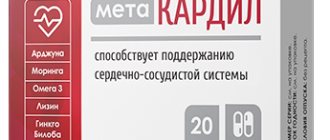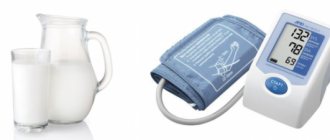Composition of the drug
The main active ingredient in aspirin is acetylsalicylic acid in an amount of 500 mg. Additionally, the tablets contain corn starch and microcrystalline cellulose. The tablets help relieve the pain that always accompanies a sharp increase in blood pressure.
The drug is available in tablet form and is sold in pharmacies without a doctor's prescription. You should drink plenty of water. After taking the tablets, the active substance of aspirin is quickly eliminated from the stomach.
Medicinal properties of aspirin
The use of aspirin as a medicine for pressure surges does not affect its normalization. It should be said that the main purpose of the drug is not to lower blood pressure and it is not recommended to take it regularly.
It is better to take special blood pressure medications prescribed by a cardiologist.
The product has the following therapeutic effect on the body:
- reduces elevated body temperature in viral and infectious diseases;
- promotes blood thinning;
- relieves pain in various types of pain;
- prevents the formation of blood clots;
- Has a beneficial effect on blood circulation in the vessels of the brain.
This drug is most often used for colds or flu, as well as for pain. Taking pills for hypertension is recommended if a person suffers from severe headaches due to an abnormal jump in blood pressure.
Therapeutic effect of the drug
Acetylsalicylic acid belongs to the category of anti-inflammatory drugs, produces antipyretic, analgesic and antiaggregation effects. The tablets reduce the production of inflammatory mediators - prostaglandins. As a result, the inflammatory process decreases and disappears. The medicine is very effective for rheumatic processes in the body. It affects the areas of the brain responsible for thermoregulation processes and pain sensations, thereby reducing temperature and eliminating pain.
The drug prevents platelets in the blood from sticking together, thinning the blood fluid. For this reason, the vessels relax and the pain disappears. Doctors often prescribe medicine to patients prone to blood clots to prevent the development of stroke and heart attack. The drug can reduce the risk of miscarriages and helps patients with cataracts and migraines. But how does Aspirin affect blood pressure - does it increase or decrease?
Indications for use of aspirin
Aspirin is an NSAID (non-steroidal anti-inflammatory drug). This medication is intended to relieve pain of various localizations:
- in the teeth;
- in the head;
- in muscles, joints;
- in back;
- in the throat;
- during menstruation.
Despite the fact that aspirin does not reduce blood pressure, the headache that often accompanies such phenomena as hypertension and hypotension disappears. Acetylsalicylic acid can also reduce fever when body temperature rises in adults and adolescents over 15 years of age.
When determining whether it is possible to take aspirin for a long time, it is necessary to pay attention to the following aspects of health: the nature of damage to the organs that are being treated, the presence of chronic diseases. Despite the fact that the drug itself does not affect blood pressure, this indicator will need to be monitored when prescribing treatment.
Effect on blood pressure
Scientists from Spain conducted studies to find out whether Aspirin increases or decreases blood pressure. To obtain the data, they prescribed the drug to one group of patients at bedtime for three months. Others took the medication in the morning, while others followed other recommendations to lower blood pressure. In the first group of patients, blood pressure stopped increasing. There were no changes for the rest. Doctors were surprised by the results and began to recommend Aspirin to prevent high blood pressure.
In general, medical experts are of the opinion that Aspirin does not lower or increase blood pressure. But the drug thins the blood well and improves its movement through the vessels. Aspirin reduces vascular tone. As a result of the dilation of blood vessels, the rate of blood flow decreases and the pressure decreases. To reduce blood viscosity, the minimum dose of the drug is sufficient. For a cold, the patient takes a much larger amount of medicine. Therefore, drugs with lower dosages are produced for hypertensive patients. They have much fewer side effects.
Indications for use
The effect of reducing high blood pressure when taking aspirin is achieved through active blood thinning. In addition, the components of the drug prevent the adhesion of individual blood components.
Taking aspirin is recommended in the following cases:
- Acute respiratory infections and acute respiratory infections;
- flu;
- heat;
- pain in the head and teeth;
- muscle pain;
- aching joints;
- sore throat if caused by a cold;
- Backache.
Anti-hypertension pills are mainly used to prevent complications from developing. In most cases, similar drugs are used in such cases. The therapeutic effect of using tablets for vascular diseases is due to the prevention of heart attacks and strokes.
Many hypertensive patients use it to reduce surges in blood pressure, but it only works in combination with special medications prescribed by a cardiologist.
With high intracranial pressure, the effect of aspirin can be achieved in the shortest possible time. This will relieve the headache and eliminate the consequences of the attack.
How does aspirin work?
As already mentioned, the drug does not reduce blood pressure, but acts, due to which self-regulation mechanisms are activated, and the person feels relief after taking it.
First of all, it helps relieve the symptoms of hypertension that accompany the disease during the next attack. These include headaches. After taking the pill, the migraine goes away, so the attack is not felt so strongly. This effect is due to the fact that salicylates have the ability to reduce the algogenic effect of bradykinin, as well as affect the centers of pain sensitivity.
Another effect of the drug for hypertension is blood thinning. This mechanism, in turn, calms the feeling of well-being during a surge in blood pressure and helps return it to normal. The blood-thinning effect helps reduce intracranial pressure, which also eliminates the unpleasant symptoms of hypertension.
But there are also negative aspects of the drug’s effect on the body. With frequent use, the tablets cause disorders of the gastric mucosa, ulcers, bleeding and a number of other side effects. The drug should be taken as rarely as possible. Moreover, to lower blood pressure it is recommended to use medications specifically designed for this purpose.
gormed.su
Low blood pressure is not as common as hypertension, however, it brings no less trouble. Women especially suffer from hypotension during pregnancy and those who are on a diet.
The main symptoms of impending fainting against the background of low pressure are arrhythmia, severe headache, lightheadedness, flashing of black or white luminous spots before the eyes. Basic first aid methods for low blood pressure are suitable both for those who have an attack alone, and for people who are on the street or in a public place.
- If you feel symptoms that indicate imminent fainting, you need to sit down. Keep your breathing calm and lower your head down to knee level. Even if you feel better, rest for another 20-30 minutes without getting up.
- If there is a sudden deterioration in your general condition (very dizzy), use acupuncture (acupressure). For 3 minutes, you need to massage the point between the base of the nose and the lip (helical movements). The second option is a point on the little finger of the hand, near the nail, closer to the ring finger. It is advisable to massage both fingers. This is first aid that can be done independently without attracting undue attention, for example, at a lecture or in the theater.
- To relieve spasmodic headaches, massage your neck, arms and back of your head with force. You can put mustard plasters on your calves for 5 minutes. At work, it will be more convenient to immerse your hands in hot water up to your elbows for 10 minutes, and then quickly and vigorously rub your limbs.
- A heating pad will relieve sudden loss of strength. Apply it to your neck, forehead, ears and nose. A glass of hot tea will replace a heating pad in the workplace. They can warm your nose and hands.
- Aromatherapy. A couple of drops of essential oil on a handkerchief will help restore strength. Breathing calmly for 5 minutes can work wonders. Use lavender, jasmine, mint, rosemary, and clove oils.
- Regular exercise will help relieve drowsiness. Sitting on a chair, spread your legs and cross your arms behind your head. Slowly lower yourself to your knees, taking a deep breath before doing so. As you exhale, straighten up. Three times is enough to improve blood circulation.
- If low blood pressure constantly bothers you, then it’s a good idea to take walks instead of lying or sitting. This is especially true for pregnant women, whose blood pressure monitoring is mandatory. When moving, blood circulates faster through the veins, which helps to warm the body faster. If an attack threatens to occur while you are walking, then you should go to the nearest cafe for hot tea or coffee.
If blood pressure regularly drops below a critical level, then it is worth visiting a doctor and undergoing a course of treatment, including taking tonic drugs and adaptogens.
Using aspirin for blood pressure
When blood pressure jumps at the most inopportune moment, and there is no suitable medicine at hand, hypertensive patients ask themselves: to lower or increase blood pressure? We must state unequivocally that this drug does not have a significant effect on lowering blood pressure. You should consult your doctor about its use for hypertension.
There are certain rules that, if followed, will minimize the harm from taking aspirin during surges in blood pressure:
- The tablets should be taken some time after meals. Taking medications on an empty stomach is undesirable due to possible negative effects on the stomach.
- Take the drug with clean water (tea, lemonade and other drinks are not recommended).
- It is not recommended to combine medication with alcohol consumption (even light alcohol). Such a mixture can lead to unpredictable results.
Taking aspirin is most effective for symptoms of coronary heart disease. In other cases, it is important not to take the medicine too often.
Aspirin is a sedative and is not intended to treat high blood pressure.
Rumors that the use of aspirin helps lower blood pressure were provoked by an experiment by Spanish scientists. They identified three groups of people. The first group did not take any medications, followed a diet and led a healthy lifestyle, which should have led to a natural decrease in blood pressure. The second group took aspirin every day before bed. The third group, on the contrary, took medication in the morning after waking up.
As a result of the experiment, it was noticed that in the first and last groups these values did not change. In the second group, pressure surges became less frequent. Based on this, it was found that when used at night, aspirin helps lower blood pressure. But this was an experiment, and the patients were under the supervision of doctors. It is not recommended to simply take aspirin at night every day.
For high blood pressure
Medical scientists have proven that in case of high blood pressure, using aspirin at night is quite effective, which cannot be said about using tablets during the day and in the morning.
Abnormally high blood pressure often leads to severe headaches that are difficult to relieve with medication. This symptom occurs in all patients with arterial hypertension. As you know, aspirin is intended to relieve headaches and tension. Therefore, in addition to pills that lower blood pressure, many hypertensive patients take aspirin.
There are a number of high blood pressure medications that also contain acetylsalicylic acid, but in lower doses than aspirin. These are Aspirin-Cardio and Cardiomagnyl.
At low pressure
With hypotension, as with hypertension, aspirin does not affect blood pressure. Take it as a means to normalize low blood pressure. Its use is justified only in cases of severe hypotonic headache. Aspirin relieves headaches.
Contraindications
Heart attack. First of all, in case of a heart attack, you should take a simple aspirin tablet, which you chew and swallow. This gives a chance for the blood clot to dissolve and blood clotting to decrease, which will not allow the blood clot to develop rapidly, because this threatens to completely block the lumen.
Aspirin is also used for:
- treatment and preventive measures of cardiovascular diseases;
- prevention of blood clots;
- elevated body temperature;
- painful sensations of various etiologies;
- swelling.
For elevated blood pressure, aspirin is used at a dose of 100 mg daily; if this concerns cardiomagnyl, then you should take one tablet of this medicine. This will help resolve the blood clot and reduce the development of thromboembolism. But it is not advisable to limit yourself to aspirin alone; complex therapy is needed here. Take aspirin either with meals or half an hour after meals.
In this video, the blogger talks about acetylsalicylic acid: how it affects blood pressure and whether it can be used for hypertension.
Aspirin, like every drug, has some contraindications, including:
- problems with hematopoietic functions;
- kidney and liver diseases;
- individual intolerance to components;
- bronchial asthma;
- pregnancy and breastfeeding;
- diseases of the gastrointestinal tract;
- children's age up to 12 years.
Properties of the drug
Aspirin belongs to the group of non-steroidal anti-inflammatory drugs.
The main active ingredient of the drug is acetylsalicylic acid, which has the following types of effects on the human body:
- quickly relieves pain;
- reduces elevated body temperature;
- eliminates headaches associated with increased intracranial pressure;
- reduces the risk of blood clots.
It was this property of preventing the formation of blood clots that brought Aspirin fame in cardiological circles and allowed it to be used as an effective prophylactic agent for many diseases of the heart and blood vessels.
Since the drug reduces the likelihood of platelet aggregation, it is recommended to be taken daily by all elderly people over the age of 60 years.
It is also advisable to take medication:
- after myocardial infarction;
- with severe atherosclerotic damage to the great vessels;
- in case of disturbance of cerebral blood flow;
- for various forms of arrhythmia;
- with cardiosclerosis and heart defects.
In exceptional cases, the drug may be prescribed for the prevention of heart attack in patients who do not have obvious cardiovascular disorders.
Despite rumors, Aspirin does not directly affect a person's blood pressure.
Why then is it often prescribed by cardiologists to their patients who suffer from various forms of hypertension?
The fact is that experts prescribe acetylsalicylic acid not as an antihypertensive drug, but as a drug that can effectively thin the blood and prevent the occurrence of a heart attack or stroke. According to research, it is almost impossible to influence blood pressure with Aspirin.
In cardiological practice, patients are recommended to use minimal doses of aspirin. The main drug can be replaced by a doctor with a special cardiac drug based on acetylsalicylic acid called Cardiomagnyl or Aspirin-cardio.
Answering the question “Does Aspirin lower or increase blood pressure?”, it would be correct to say that it lowers it, but only in certain cases.
For cardiovascular diseases, Aspirin is taken in very small doses (approximately 5-325 mg per day). The advantage of the drug is that it can be taken once a day.
In order not to harm your body, it is important to follow all recommendations regarding taking the drug, namely:
- always take the drug at the same time;
- take the tablet with milk or still mineral water with an alkaline environment;
- do not use the product immediately before bedtime, but only 30 minutes before bedtime;
- before the scheduled operation, 5-10 days before the intervention, stop taking the medication;
- Never take tablets on an empty stomach.
If long-term use of acetylsalicylic acid is necessary, it is better to give preference to dosage forms that dissolve in the intestines, bypassing the stomach, as well as injectable versions of the drug.
Despite the fact that this drug is recognized as the best antiplatelet agent (a drug that prevents the formation of blood clots), it has a whole list of side effects that can significantly harm human health.
Thus, the systematic use of aspirin is prohibited for patients suffering from gastric and duodenal ulcers. In this category of the population, the medication can provoke an exacerbation of the underlying disease or cause the development of its complications, for example, perforation or bleeding from an ulcer.
Even in healthy people, Aspirin can cause ulcers if taken repeatedly on an empty stomach. Also, the drug often causes sudden bronchospasm in asthmatics, which leads to suffocation and tissue hypoxia, and also provokes the development of a full-blown attack of bronchial asthma.
Acetylsalicylic acid in children of preschool and early school age can provoke dysfunction of the cerebral cortex and disorders in the functioning of the hepatobiliary system.
For infants, taking the drug is sometimes fatal, as it potentiates the development of Reye's syndrome.
The medication, affecting blood thinning, causes bleeding in large quantities. It is especially dangerous for women who are expecting the birth of a child. In such patients, Aspirin can cause placental abruption with all the consequences for the body of the mother and her baby.
It is important to remember that in case of an overdose, the drug can lower blood pressure to critical levels.
On the other hand, according to recent studies, regular use of aspirin in acceptable concentrations can reduce the risk of a person developing intravascular blood clots and minimize the likelihood of developing a tumor process of malignant etiology.
Contraindications
You should stop taking Aspirin in the following cases:
- individual intolerance to the active substance;
- stomach ulcer;
- children under 12 years of age;
- pregnancy and lactation;
- conditions associated with a decrease in the coagulative properties of blood;
- aspirin asthma;
- renal and liver failure;
- urolithiasis disease;
- an aortic aneurysm that dissects;
- gout;
- severe forms of diabetes mellitus complicated by acute renal failure.
Since acetylsalicylic acid does not affect a person’s blood pressure in any way, it is not advisable to take it as an antihypertensive drug. Another thing is the prevention with the help of this drug of complications of hypertension and various forms of arterial hypertension, the main provoking factor of which is the formation of blood clots.
Among such ailments, myocardial infarction and acute cerebrovascular accidents come to the fore. In patients with an increased likelihood of such pathological conditions, Aspirin can reduce the likelihood of blood clots several times by effectively thinning the blood. This leads to normalization of its rheological properties and improvement of overall blood flow.
How does aspirin affect blood counts?
Aspirin as a medicine does not have a direct effect on reducing a sharp rise in blood pressure. With high blood pressure, aspirin helps thin the thick blood and, as a result, alleviate the unpleasant symptoms of an attack. Some doctors prescribe it for diseases of the cardiovascular system.
It is not advisable to take the drug on your own; the dosage and duration of use of the tablets should be checked with your doctor. This depends on the patient’s age, the severity of hypertension and the individual characteristics of the body.
Side effects of aspirin
Despite the widespread use of the drug, its use is not always safe. Many doctors and medical scientists tend to believe that frequent use of pills leads to stomach complications, including the development of ulcers.
Contraindications for use include:
- stomach disorders (mainly ulcers);
- pregnancy;
- diabetes.
For stomach diseases, aspirin should be taken as a last resort and as rarely as possible. If you must take the tablet, it is recommended that you take it after a meal rather than on an empty stomach.
Side effects after taking aspirin:
- risk of bleeding;
- Gastrointestinal disorders;
- Endoscopic injury to the gastric mucosa (seen in people who take pills every day for a long period of time);
- The occurrence of heartburn, nausea, vomiting and heartburn;
- development of renal failure;
- deterioration of health in people suffering from bronchial asthma;
- the occurrence of allergic reactions;
- dehydration;
- central nervous system disorders, including confusion, dizziness, or headache
- hypotension;
- pulmonary edema.
When taking aspirin, a large number of side effects are observed, but with a single dose of tablets, no disturbances in other organs are observed. Side effects occur with regular use of the drug.
Side effects
Aspirin does an excellent job of preventing the formation of blood clots. But the medicine is not without negative effects.
The product is contraindicated:
- for peptic ulcers of the gastrointestinal organs;
- for bronchial asthma;
- during the period of bearing a child;
- children under 12 years old.
In patients with ulcerative formations, Aspirin can lead to bleeding. The drug injures the gastric mucosa, therefore it is contraindicated for gastritis, colitis, and erosions. And in people with bronchial asthma it can provoke bronchospasm. In children under 12 years of age, the medicine can cause the development of Reye's syndrome, a disorder of the brain and liver. The drug is not prescribed to pregnant women due to the possible risk of bleeding and causing miscarriage in the first or last trimester of pregnancy. Aspirin is also not prescribed to nursing women, since it is concentrated in breast milk in large quantities, which is unacceptable for an infant.
Drug analogues
Among the popular aspirin analogues aimed at lowering blood pressure, Aspirin-Cardio stands out. This reduces blood pressure surges and smoothes them out. Moreover, unlike regular aspirin, the therapeutic effect of the drug does not have a negative effect on the gastric mucosa.
In order to lower blood pressure during hypertension, it is recommended to use analogues of tablets, and not the drug itself. You should not take pills that only indirectly contribute to the normalization of health. Frequent use of medications always has a negative effect on the stomach and liver. Therefore, in order to avoid the consequences of frequent use of tablets, it is recommended to take the drug prescribed by the doctor in a strict dosage. And if this doesn’t work, consult a specialist, but do not eliminate the symptoms with emergency measures.
What do the doctor's say
Is it possible to take Aspirin for high blood pressure? Doctors say that it can be drunk in moderate dosages for hypertension. However, it is prohibited to use it constantly. If blood clotting is impaired, it is better to avoid Aspirin to reduce blood pressure. In addition, constant medical supervision is required while taking it. If hypertension is treated with Aspirin, this should be done in combination with other medications.
Doctors remind that with prolonged use, acetylsalicylic acid weakens the gastric mucosa, which can lead to internal bleeding. It is not recommended to use Aspirin for gastritis, ulcers and ulcerative colitis.










